Heet Sankesara
An Explainable Anomaly Detection Framework for Monitoring Depression and Anxiety Using Consumer Wearable Devices
May 05, 2025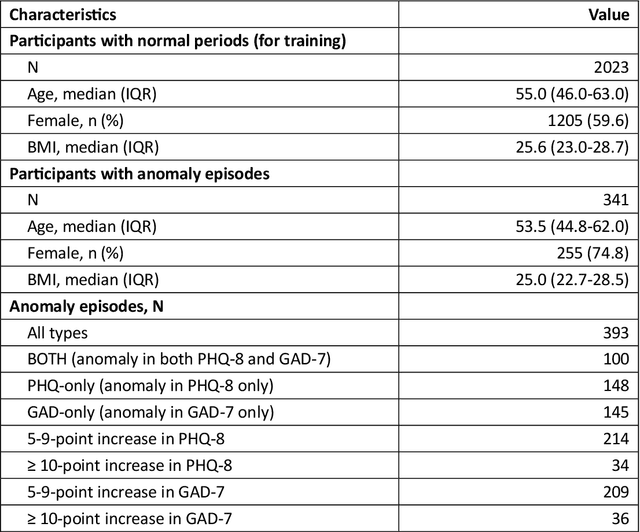
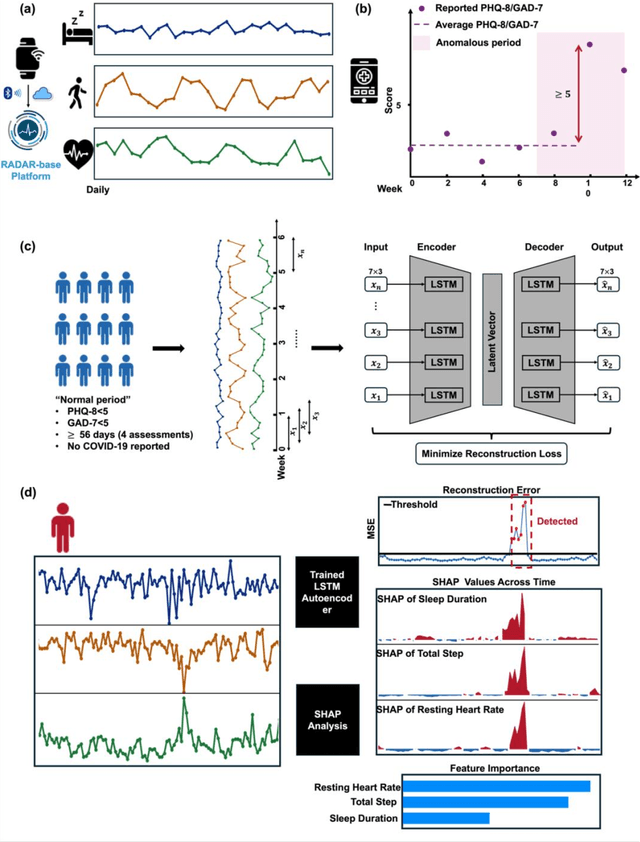
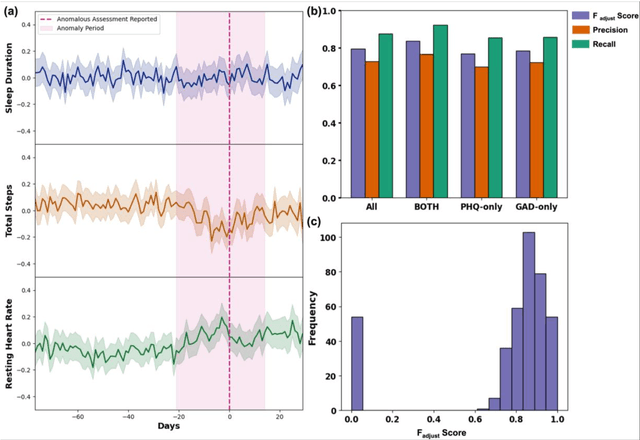
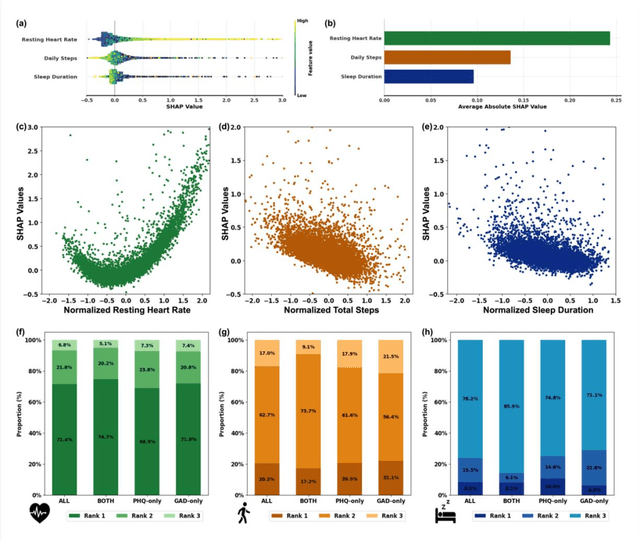
Abstract:Continuous monitoring of behavior and physiology via wearable devices offers a novel, objective method for the early detection of worsening depression and anxiety. In this study, we present an explainable anomaly detection framework that identifies clinically meaningful increases in symptom severity using consumer-grade wearable data. Leveraging data from 2,023 participants with defined healthy baselines, our LSTM autoencoder model learned normal health patterns of sleep duration, step count, and resting heart rate. Anomalies were flagged when self-reported depression or anxiety scores increased by >=5 points (a threshold considered clinically significant). The model achieved an adjusted F1-score of 0.80 (precision = 0.73, recall = 0.88) in detecting 393 symptom-worsening episodes across 341 participants, with higher performance observed for episodes involving concurrent depression and anxiety escalation (F1 = 0.84) and for more pronounced symptom changes (>=10-point increases, F1 = 0.85). Model interpretability was supported by SHAP-based analysis, which identified resting heart rate as the most influential feature in 71.4 percentage of detected anomalies, followed by physical activity and sleep. Together, our findings highlight the potential of explainable anomaly detection to enable personalized, scalable, and proactive mental health monitoring in real-world settings.
Large-scale digital phenotyping: identifying depression and anxiety indicators in a general UK population with over 10,000 participants
Sep 24, 2024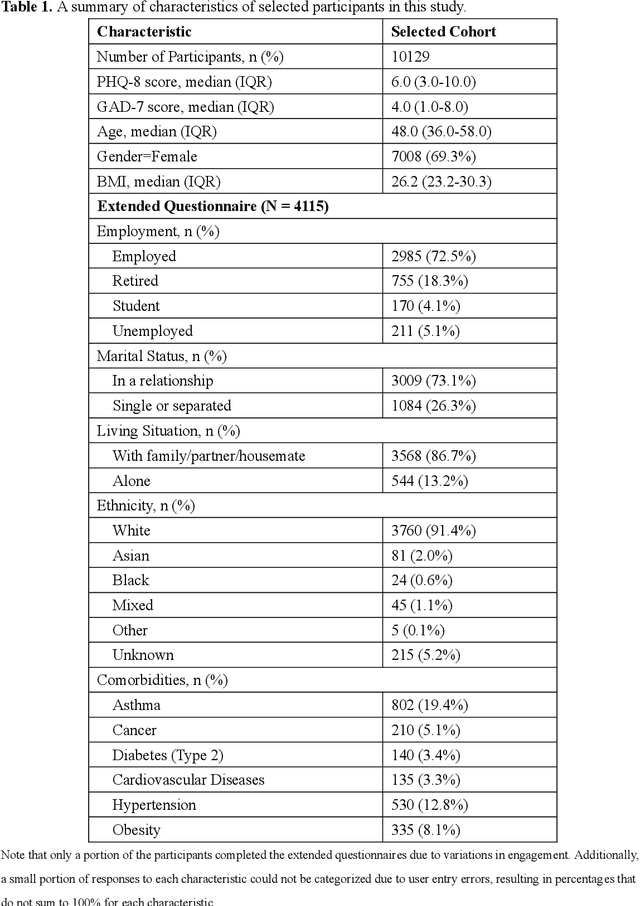



Abstract:Digital phenotyping offers a novel and cost-efficient approach for managing depression and anxiety. Previous studies, often limited to small-to-medium or specific populations, may lack generalizability. We conducted a cross-sectional analysis of data from 10,129 participants recruited from a UK-based general population between June 2020 and August 2022. Participants shared wearable (Fitbit) data and self-reported questionnaires on depression (PHQ-8), anxiety (GAD-7), and mood via a study app. We first examined the correlations between PHQ-8/GAD-7 scores and wearable-derived features, demographics, health data, and mood assessments. Subsequently, unsupervised clustering was used to identify behavioural patterns associated with depression or anxiety. Finally, we employed separate XGBoost models to predict depression and anxiety and compared the results using different subsets of features. We observed significant associations between the severity of depression and anxiety with several factors, including mood, age, gender, BMI, sleep patterns, physical activity, and heart rate. Clustering analysis revealed that participants simultaneously exhibiting lower physical activity levels and higher heart rates reported more severe symptoms. Prediction models incorporating all types of variables achieved the best performance ($R^2$=0.41, MAE=3.42 for depression; $R^2$=0.31, MAE=3.50 for anxiety) compared to those using subsets of variables. This study identified potential indicators for depression and anxiety, highlighting the utility of digital phenotyping and machine learning technologies for rapid screening of mental disorders in general populations. These findings provide robust real-world insights for future healthcare applications.
Identifying depression-related topics in smartphone-collected free-response speech recordings using an automatic speech recognition system and a deep learning topic model
Sep 05, 2023



Abstract:Language use has been shown to correlate with depression, but large-scale validation is needed. Traditional methods like clinic studies are expensive. So, natural language processing has been employed on social media to predict depression, but limitations remain-lack of validated labels, biased user samples, and no context. Our study identified 29 topics in 3919 smartphone-collected speech recordings from 265 participants using the Whisper tool and BERTopic model. Six topics with a median PHQ-8 greater than or equal to 10 were regarded as risk topics for depression: No Expectations, Sleep, Mental Therapy, Haircut, Studying, and Coursework. To elucidate the topic emergence and associations with depression, we compared behavioral (from wearables) and linguistic characteristics across identified topics. The correlation between topic shifts and changes in depression severity over time was also investigated, indicating the importance of longitudinally monitoring language use. We also tested the BERTopic model on a similar smaller dataset (356 speech recordings from 57 participants), obtaining some consistent results. In summary, our findings demonstrate specific speech topics may indicate depression severity. The presented data-driven workflow provides a practical approach to collecting and analyzing large-scale speech data from real-world settings for digital health research.
Disease Insight through Digital Biomarkers Developed by Remotely Collected Wearables and Smartphone Data
Aug 03, 2023



Abstract:Digital Biomarkers and remote patient monitoring can provide valuable and timely insights into how a patient is coping with their condition (disease progression, treatment response, etc.), complementing treatment in traditional healthcare settings.Smartphones with embedded and connected sensors have immense potential for improving healthcare through various apps and mHealth (mobile health) platforms. This capability could enable the development of reliable digital biomarkers from long-term longitudinal data collected remotely from patients. We built an open-source platform, RADAR-base, to support large-scale data collection in remote monitoring studies. RADAR-base is a modern remote data collection platform built around Confluent's Apache Kafka, to support scalability, extensibility, security, privacy and quality of data. It provides support for study design and set-up, active (eg PROMs) and passive (eg. phone sensors, wearable devices and IoT) remote data collection capabilities with feature generation (eg. behavioural, environmental and physiological markers). The backend enables secure data transmission, and scalable solutions for data storage, management and data access. The platform has successfully collected longitudinal data for various cohorts in a number of disease areas including Multiple Sclerosis, Depression, Epilepsy, ADHD, Alzheimer, Autism and Lung diseases. Digital biomarkers developed through collected data are providing useful insights into different diseases. RADAR-base provides a modern open-source, community-driven solution for remote monitoring, data collection, and digital phenotyping of physical and mental health diseases. Clinicians can use digital biomarkers to augment their decision making for the prevention, personalisation and early intervention of disease.
 Add to Chrome
Add to Chrome Add to Firefox
Add to Firefox Add to Edge
Add to Edge